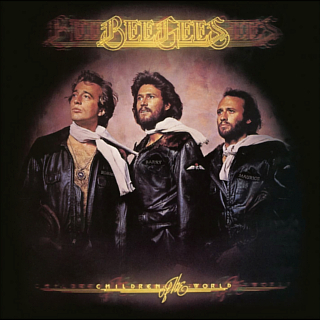
Children of the World is the fourteenth studio album by the Bee Gees, released in 1976 by RSO Records. The first single, "You Should Be Dancing", went to No. 1 in the US and Canada, and was a top ten hit in numerous other territories. The album was re-issued on CD by Reprise Records and Rhino Records in 2006. This was the first record featuring the Gibb-Galuten-Richardson production team which would have many successful collaborations in the following years. Many consider this a "prologue" to the band's foray into disco, which would culminate with the Saturday Night Fever soundtrack the following year.

Living Eyes is the sixteenth studio album by the Bee Gees, released in 1981. It was the band's final album on RSO Records, which would be absorbed into Polydor and subsequently discontinued. The album showcased a soft rock sound that contrasted with their disco and R&B material of the mid-to-late 1970s; having become a prominent target of the popular backlash against disco, the Bee Gees were pressured to publicly disassociate from the genre.

Eaten Alive is the sixteenth studio album by American R&B singer Diana Ross, released on September 24, 1985, by RCA Records in the United States, with EMI Records distributing elsewhere. It was Ross' fifth of six albums released by the label during the decade. Primarily written and produced by Barry Gibb of the Bee Gees, with co-writing from his brothers Andy, Maurice, and Robin, the album also includes a contribution from Ross' friend Michael Jackson who co-wrote and performed (uncredited) on the title track.

"Shadow Dancing" is a disco song performed by English singer-songwriter Andy Gibb. The song was released in April 1978 as the lead single by RSO Records from his second studio album of the same name. The song reached number one for seven consecutive weeks on the Billboard Hot 100 in 1978. It was written by Andy and his older brothers, Barry, Maurice and Robin Gibb and Albhy Galuten arranged the song with Barry Gibb. While Andy Gibb would have three more Top 10 hits in the U.S., this would be his final chart-topping hit in the United States. The song became a platinum record.
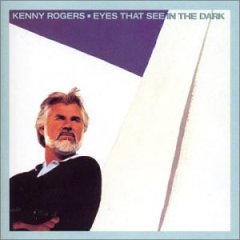
Eyes That See in the Dark is the fifteenth studio album by American country singer Kenny Rogers, released by RCA Records in August 1983.
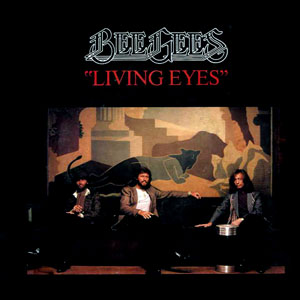
"Living Eyes" is a power ballad recorded by the Bee Gees and was released in November 1981 as the second single and title track off the LP of the same name. It was written by Barry, Robin & Maurice Gibb. The sound of this single was closer musically to the rest of the album than its predecessor, "He's a Liar".

After Dark is the third and final studio album by English singer-songwriter Andy Gibb. It features his last US Top 10 single "Desire", "I Can't Help It" and two Bee Gees numbers "Rest Your Love on Me" and "Warm Ride".

"Guilty" is a vocal duet between Barbra Streisand and Barry Gibb. The song was written by all three Bee Gees: Barry, Robin & Maurice Gibb. Released as a single from Streisand's 1980 album of the same name, "Guilty" peaked at No. 3 on the US Billboard Hot 100 chart and No. 5 on the adult contemporary chart. In the UK, the song reached No. 34 on the UK Singles Chart. The single was certified gold by the RIAA. In addition, "Guilty" won a Grammy Award in the category Best Pop Vocal Performance, Duo or Group. The song also appeared on the 2001 Bee Gees compilation, Their Greatest Hits: The Record.

Heartbreaker is a studio album by American singer Dionne Warwick. It was released by Arista Records on September 28, 1982, in the United States. Her fourth album with the label, it was largely written by the Bee Gees, and produced by band member Barry Gibb along with Karl Richardson and Albhy Galuten; Gibb and Galuten also served as musicians on the album. Warwick recorded the songs on Heartbreaker during the spring of 1982.
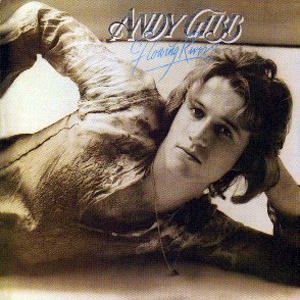
Flowing Rivers is the debut studio album by English singer-songwriter Andy Gibb. The album was produced by Albhy Galuten and Karl Richardson, with Barry Gibb on two tracks. It was released in September 1977 on RSO. Flowing Rivers was re-released by Polydor Records in 1998 in CD version.
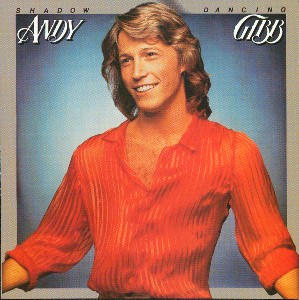
Shadow Dancing is the second studio album by English singer-songwriter Andy Gibb, released by RSO Records in June 1978 in the United States and September 1978 in the United Kingdom. It was Gibb's highest charting album in some countries including America and in Canada. This LP was his only album to chart in the UK. Four singles, including the three US Top 10 singles, were released from the album.
"Rest Your Love on Me" is a country ballad performed by the Bee Gees and written and sung by Barry Gibb. It was the B-side of the US No. 1 hit "Too Much Heaven". Andy Gibb recorded the song as a duet with Olivia Newton-John for his 1980 album After Dark.
"Evening Star" is a song written by Barry and Maurice Gibb, and recorded by American country music artist Kenny Rogers. It was released in June 1984 as the third single from the album Eyes That See in the Dark. The song reached No. 11 on the Billboard Hot Country Singles & Tracks chart.
"This Woman" is a song written by Barry Gibb and Albhy Galuten and was performed by American country recording artist Kenny Rogers. It reached No. 2 in the US Adult Contemporary Chart and No. 23 in the US Pop Chart. It was published by Gibb Brothers Music and Unichappell Music.

"Ain't Nothing Gonna Keep Me From You" is a song written by Barry Gibb in 1977. It was recorded by Teri DeSario and was her debut single and was included on her debut album Pleasure Train (1978). It entered the US charts on 22 July 1978, the same week that the number-one single was Andy Gibb's "Shadow Dancing", which was co-written by Barry and co-produced by Albhy Galuten. The musicians who played on this song also played on "Shadow Dancing". The single peaked at #43 on the Billboard Hot 100.
"Paradise" is a pop ballad recorded by the Bee Gees included on the 1981 album Living Eyes. It was later released as a single in Netherlands and Japan with "Nothing Could Be Good" as the B-side. It was included on the 1983 greatest hits album Gold & Diamonds.
"You and I" is a song written by Barry, Robin and Maurice Gibb and was recorded and performed by Kenny Rogers from his 1983 album Eyes That See in the Dark. Despite not being released as a single, it has been played on the radio, becoming one of Rogers' most popular songs, eventually becoming a number-one hit in Brazil in December 1983. Barry Gibb sings background vocals on the intro, chorus, interlude. The performer of the song sometimes credited to 'Kenny Rogers and the Bee Gees' because Barry used his falsetto.
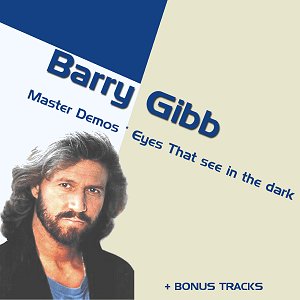
The Eyes That See in the Dark Demos is an album of demos by Barry Gibb created for the production of Kenny Rogers' 1982 album Eyes That See in the Dark. Originally circulating as a bootleg, the collection saw a legitimate release on iTunes in October 2006.

"Eyes That See in the Dark" is a song written by Barry and Maurice Gibb in 1982. It was recorded by American singer Kenny Rogers for his 1983 album of the same name. It reached #30 on the US Country chart, #4 on the US Adult Contemporary chart, #61 in the United Kingdom and #79 on the Billboard Hot 100.
Gibb-Galuten-Richardson were a British-American record producing team, consisting of Bee Gees founding member and British singer-songwriter Barry Gibb, American musician and songwriter Albhy Galuten and American sound engineer Karl Richardson. They produced albums and singles for Andy Gibb, Samantha Sang, Frankie Valli, Teri DeSario, Barbra Streisand, Dionne Warwick, Kenny Rogers, Dolly Parton and Diana Ross.














